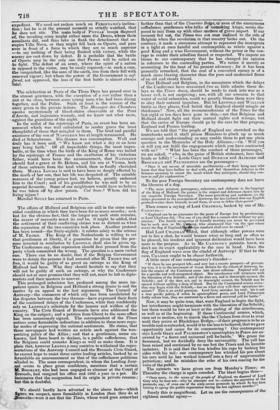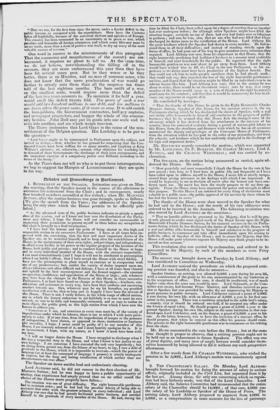. We should hardly have adverted to the above facts—which
ilgure, we suspect, more formidably in London than they do at .Prussels—were it not that the Times, whose word goes somewhat farther than that of the Courrier Beige, or even of the anonymous coffeehouse gentleman who talks of unmaking kings, seems dis- posed to mix them up with other matters of grave import. If our memory fail riot, the Times was not over inclined to the side of Belgium when the revolution in that country broke out. On the contrary, it made a strenuous attempt to represent the insurgents in a light at once hateful and contemptible, as rebels against a good King and a wise Government, without the power or the cou- rage to render their rebellion feared or respected. We impute no blame to our contemporary that he has changed his opinion in reference to the contending parties. We notice it merely as accounting for the heat of his present advocacy; for it has been generally remarked, that the zeal of a converted enemy is of a much more blazing character than the pure and moderated flame of an old and steady friend. - That Holland and Belgium, in the uneasiness which the delays of the Conference have occasioned (we as little admire these de- lays as the Times does), should be ready to rush into war as a lesser evil, is not surprising; nor, with all our aversion to that worst of social calamities, could we greatly blame them were they to obey their natural impulses. But let LEOPOLD and WILLiasir battle as they please, God forbid that England should mingle as thirdsman ! Now, all the recommendations of the Times for the last eight or ten days have gone to this,—not that Belgium and Holland should fight out their mutual rights and wrongs, but that the entire of Europe should go by the ears for that purpose, England and France leading.
We are told that " the people of England are stretched on the tenterhooks until it shall please Ministers to pluck up so much courage and understanding as may enable them to put one plain question to the Monarchs of the Holy Alliance,—viz. Will you or will you not fulfil the engagements which you have contracted with us ?' " "What has been the conduct of those personages," we are asked, "who, in the guise of British statesmen, bear their heads SO loftily ?"—Lords GREY and DURHAM and ALTHORP and BROUGHAM and PALMERSTON are the personages— "Does it not savour of miserable pusillanimity—of their being men who know that they have bullies to deal with, and feel themselves deficient in the firmness necessary to resent the insult which they anticipate, should they ven- ture to call for explanation."
To the poor Foreign Secretary our contemporary does not leave the likeness of a dog.
"The more petulant, peremptory, refractory, and obdurate is the language of the King of Holland, the greater is the respect and deference shown him by our exquisite Foreign Secretary. The more provoking and indefinite are the delays presented to the evacuation of Antwerp, the less inclined does our English protocol-writer show himself, to end them, or even to define their period." Then comes a saying of Lord CHATHAM, backed by one of Mr. CANNING- "England can be no guarantee for the peace of Europe but by proclaiming, as Lord Chatbam did, Not one of you shall fire a cannot-shot without my per- mission.' The hostile occupation of friendly territory can never be prevented but by such men as Mr. cab ing, who announced that on the spot where• waves the flag of Englandeig-n standard shall ever be raised.'" Had Lord CHATHAAetaded, that although other powers were not to fire a shot, he would bounce away as long and as often as he pleased, his insolent and ignorant declaration would have been more to the purpose. As to Mr. CANNING'S patriotic burst, we don't see its exact applicability to the case in hand. Does the flag of England wave over the citadel of Antwerp? If that be the case, CHA.SSEE ought to be chasse forthwith. A little more of our contemporary's thunder— "If there be one prospect left—and now but a remote prospect—of prevent- ing war, it is in the movement of Great Britain for the release of Antwerp, be- fore the armies of the Continent come into direct collision. England will act for a specific and well-recognized object. Her interference will terminate with the liberation of the Scheldt; and if she does act, and in downright earnest, the Scheldt ; and if she does act, and in downright earnest, the Scheldt may be opened without spilling a drop of blood. But let the Continental armies move; they may begin with the Scheldt,—but on what river will their operations ter- minate? This is an awful question. Lord Grey mistakes his road : his is not a true pacific policy, if when he apostrophizes peace, and Lord Palmerston feebly echoes him, they are answered by a fierce and universal yell for battle."
Now, it may be quite true, that, were England to begin the fight, her interference might terminate with the liberation of the Scheldt; but there would be two at least at the ending of the interference, as well as at the beginning. If these Continental armies, which, once set in motion, are to march like the Cholera from river to river until they arrive at Blackfriars Bridge,—if their progress is to be so terrible and so extended, would it be the less to be feared, that we gave opportunity and cause for its commencing ? Our contemporary says Lords GREY and PALMERSTON'S apostrophies to Peace are an- swered by "a fierce and universal yell for battle." We grant the fierceness, but we decidedly deny the universality. The yell has been raised and continued by no one but the Times and its humble imitators. It is said that the lion kindles his rage by lashing his sides with his tail : our contemporary has whisked his pen about his ears until he has worked himself into a fury of ungovernable patriotism; and he mistakes the echo of his own roaring for the voice of the public. The extracts we have given -are from Monday's Times; on Thursday the charge is again sounded. The blast begins thus-- "Once more, in the name of the people of England, we demand of Lord Grey why he does not—why he attempts not to—enforce the execution of the protocols, nay, of even one of the sixty-seven protocols by which he has been. raising to agony the public expectation during the last eighteen months? "
Surely this is magnificent. Let us see the consequences of the, eighteen months' agony- Here we are, for the first time since the peace, under a fearful deficit in the public income, as compared with the expenditure. Here have the Customs fallen off frightfully, because of the universal distrust and rigitatien of Europe. This country has been tormented by an uncertainty .as to peace or war, which .paralizes ana benumbs all foreign commerce, and which every Minister must be aware tends, more than a state of positive war itself, to dry up many of the most valuable sources of revenue."
One word in answer to the misstatements of this paragraph. That the commerce and manufacturers of the country are em- barrassed, it requires no ghost to tell us. At the t ame time, we do not believe, notwithstanding the falling off in the revenue, they are more embarrassed this year than they have been for several years past. But be they worse or be they better, there is• no Minister, and no man of common sense, who does not know that the mere proclamation of war would go farther to utterly ruin them than all the suspense ten times told of the last eighteen months. The bare outfit of a war, on the smallest scale, would tequire more than the deficit of the last two years amounts to. To maintain it for half a year, would swell the deficit twenty fold. Ten. years of such a war would add two hundred millions to our debt, and ten millions to our taxes when the peace came, if it came so soon. It would enrich the loan-jobbers, the Government contractors, half-pay captains, and newspaper proprietors, and beggar the whole of the commu- nity besides. John Bull may put its goods into one scale and its evils into another, and see which weigh heaviest.
The Times insinuates that Lord GREY is the cause of the non- settlement of the Belgian question. His Lordship is to be put to the question— 'Lord GREY' ought to be interrogated in Parliament upon the subject, and invited to declare,—first, whether he has ground for suspecting that the Con- tinental Courts have been trifling for so many months, and laughing at King William's advisers; or, otherwise,—second, what objection his Lordship has to demand of those Governments the discharge of their joint engagements, and the iminediate exercise of a compulsory power over Holland, according to the terms of the treaty."
As the Times does not tell us who is to put these interrogatories, we beg to suggest the Marquis of LONDONDERRY: they are quite an his way.




























 Previous page
Previous page